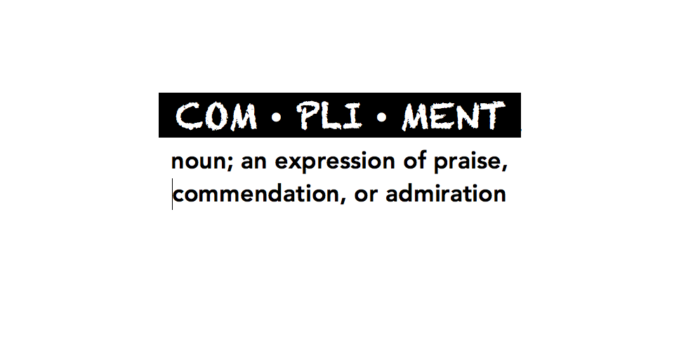You can let stress beat you up, or you can put it to work in…
The Compliment Habit
“I just can’t think of anything I can compliment them for.” People, who say this, probably deserve a compliment for at least trying to think of something for which to compliment another person. Most of us don’t take that time. At best, we wait until we’re bowled over by a personal quality of a person and the compliment comes to us. Maybe we tell it, and maybe we don’t.
Compliments are little gifts with an enormous impact. They cost you nothing and can change lives for the good – yours and others.
Why don’t we compliment others more?
We pay compliments for what we appreciate. In our time we are often too busy, too critical, too judgmental, or expect too much to appreciate much and thus fail to find compliments for those around us.
Insecurity and self-esteem issues can keep you from paying compliments. You probably are aware that when you tear others down the motive is sometimes to build yourself up. It’s a comparable situation with compliments. If you don’t build others up with compliments, you may feel better about yourself in some way.
Fear may keep you from paying compliments. You may be fearful that, somehow, a person will get ahead of you if you compliment them.
Your expectations can keep you from paying compliments. We want people to fit our expectations. If they don’t meet the expectations, no compliments. But, when they do things the way we want to the standard we want, we are more likely to compliment.
If you think they don’t deserve it, you won’t compliment. But I ask you, “What must a person do to deserve a compliment?” Certainly, your compliment is to have a basis and be truthful. But to what degree must a person demonstrate the quality to deserve a compliment.
Your desire to be appreciated and valued can keep you from paying compliments. If you don’t receive compliments, then you are not likely to pay them. You give what you get which is a bad approach to life.
Paying compliments, the value to others
A compliment extended to another person is an investment in them and their personhood. It helps to
- Nurture them to a fuller expression of their potential. What you compliment will grow.
- Encourage their heart.
- Demonstrate your respect and admiration for them as related to the subject of the compliment.
- Let them know of your approval as related to the compliment.
- Express your gratitude and appreciation.
- Engender hope in the receiver.
- Promote trust in the relationship.
Paying compliments. The value to you.
The practice of giving genuine, sincere, well-placed compliments will change the way you think and feel. As a habit, I’ve discovered that it will
- Adjust your focus from self-centered to other-centered.
- Adjust your focus from negative to positive.
- Benefit your health. Because it’s a form of gratitude it may have numerous health benefits.
- Force you to explore other perspectives as you identify compliments to give.
- Boost your energy and mood.
- Provide you with the same feeling of satisfaction as that of giving a material gift to the person.
- Elevate your positive outlook since you will be on the lookout for the positive.
- Promote your happiness and sense of well-being.
- Help you feel more connected to others.
- Open the door to improved relationships.
- Motivate you to other acts of helpfulness, generosity, and cooperation.
- Increase your resilience.
If you want your compliment to matter and be the positive gift you want to give, act on the following guidelines.
- Check your motives. The compliment must be true, genuine, trustworthy, and not manipulative, self-serving, or patronizing. Give the compliment without expectation of any return.
- Give time to your presentation. Compliments are best when well thought out and intentionally delivered without rushing through the delivery.
- Ask for permission. Ask the person if they would give you a few minutes for a compliment you’d like to pay. Set the encounter up so that they know this is not a reprimand or addressing a problem. (This decreases the sense of threat and raises trust). Examples:
- Hey, Bill, do you have a minute for a word of appreciation?
- Hey, Sarah, do you have a minute for me to pass along a good word to you?
- Mary, do you have a minute for a compliment I’d like to pass along?
- Be specific and personal. Be specific about the source of the compliment by stating the character quality. Then give an example of how you observed the quality you are complimenting. What behavior did you observe? Examples:
- Mary, you are a very flexible person, and I appreciate that quality so much. It is valuable to me personally and so valuable to our customer service. I’ve noticed it in several situations lately including when you had to stay a little late on Tuesday to help XYZ company. Thank you.
- John, I want to thank you for being a responsible person. I know that when you agree to an assignment or say you will do something, I can count it done and not think about it again. This was especially valuable recently when we needed your expertise on the ABC case that required so much of us. Thank you.
- Make the compliment unique to that person. You may compliment many people for being punctual but make the compliment unique by telling each how their being punctual made a difference.
- Ricardo, I want to tell you how much I appreciate your punctuality related to client meetings. Because our clients’ time is so valuable your punctuality adds value to those client meetings. The clients notice it and appreciate it. Thank you.
- Arrange to make the compliment outside the hearing of others. You can affirm the person in the presence of others at another time, if appropriate. It doesn’t have to be a big meeting or production, simply step to the side as needed and pay the compliment.
- Take time to deliver it. Avoid throwing out a compliment while passing in a hurry.
- Make eye contact. Take the time to look the person in the eye and deliver your compliment.
- If you have a tough time remembering what to say, write it out and read it, then give the person your written version.
- Use an intentionally warm tone of voice (but not fake) and slow the tempo of your speech down a little. Don’t be afraid of silence.
- Don’t be surprised if the eyes of the person receiving the compliment fill with tears and tears run down their face. Hand them a tissue.
- Thank the person for their time.
What to Compliment – 58 Qualities
Of course, you can pay a person compliments for the things that will eventually go away or rot in the grave like their appearance, clothing, or possessions. And, you can pay compliments for behavior. But, generally, take care about complimenting aspects of appearance lest you be misunderstood. You do not want to be accused of sexual harassment of any kind.
Complimenting the appearance, clothing, or possessions is all OK. However, I suggest you compliment the sources of the behavior, the more enduring qualities of an individual, their character. Try complimenting people because they demonstrate one of these qualities:
| Alertness | Discipline | Kindness | Service |
| Attentiveness | Endurance | Learner’s heart | Sincerity |
| Authenticity | Flexibility | Loyalty | Supportiveness |
| Boldness | Forgiveness | Mercy | Teachable |
| Candor | Generosity | Openness | Thoroughness |
| Courage | Gentleness | Orderliness | Thoughtfulness |
| Compassion | Giving | Patience | Thriftiness |
| Consistency | Goodness | Perseverance | Tolerance |
| Contentment | Graciousness | Punctuality | Transparency |
| Creativity | Gratefulness | Resourcefulness | Trustworthiness |
| Decisiveness | Honesty | Respectfulness | Truthfulness |
| Dependability | Hospitality | Responsibility | Unselfishness |
| Determination | Humility | Self-control | Wisdom |
| Devotion | Integrity | Selflessness | </td |
| Diligence | Initiative | Sensitivity | </td |
If you think it, say it. (The compliment, that is.)
Most of the time, “If you think it, say it,” is not good advice. But in the case of a compliment, don’t keep it to yourself. Say it.
Give compliments even if you don’t feel like it. We may withhold deserved compliments because, though we know the person deserves it, we don’t feel like giving it. Intentionally withholding a compliment can be a way of passive-aggressively punishing the other person. So, give the compliment. Maybe an emotion will come and maybe not.
When someone wants to compliment you, do this.
- Stop whatever you are doing and pay complete attention.
- Look the person complimenting in the eye. (Don’t stare them down.)
- Smile, they are giving you a gift.
- Do not interrupt the giver.
- When they finish, say, “Thank you very much.”</li
- Do not say, “Oh well . . .” and then try to minimize, in any way, their reason for complimenting you. That’s false humility, and people see right through it. It’s disrespectful of the gift they are giving to you.
- Take time later to absorb and celebrate the compliment completely.
“I can live for two months on a good compliment.” — Mark Twain
Some Helpful Practices and Tools to Jump-start the Compliment Habit
It may be helpful to create a compliment bank comprised of a file of compliments with notes containing the person’s name, the character quality for which you are complimenting them, and the behavior you observed. This makes sense because
- It will help you avoid, “I just can’t think of anything I can compliment them for.”
- When you think of a compliment for someone, they may not be around.
- Once you get started with the compliment habit, you may think of more than one at a time for a person(s) in your sphere of relationships.
The Compliment Day of the Week
To get you jump-started with the habit, designate a day of the week when you will pay compliments to 2-3 people at work and/or each person in your family.
Few, if any, compliment themselves for fear they might be arrogant or think more highly of themselves than they ought. For some, this may be true but for most, not. If you struggle with paying a compliment to yourself, you are
- Not likely arrogant
- Have a less-than-accurate view of yourself
For each compliment you pay to another person, quietly pay one to yourself. Celebrate your character and growth in it. Pay yourself a compliment for qualities of bad character and associated behaviors you do not possess. Then give thanks for that growth and look forward to more.
20 Adjectives to Describe Behavior
| Desirable | First-rate | Inspiring | Special |
| Effective | Great | Noteworthy | Superior |
| Excellent | Helpful | Outstanding | Useful |
| Exceptional | Important | Remarkable | Valuable |
| Extraordinary | Impressive | Respectable |
25 Verbs to Use in Compliments
| Acknowledge | Consider | Perceive | Thank |
| Admire | Experience | Recognize | Think |
| Appreciate | Grateful | Regard | Value |
| Believe | Honor | Respect | View |
| Commend | Know | Salute | |
| Compliment | Notice | See | |
| Congratulate | Observe | Spot |





